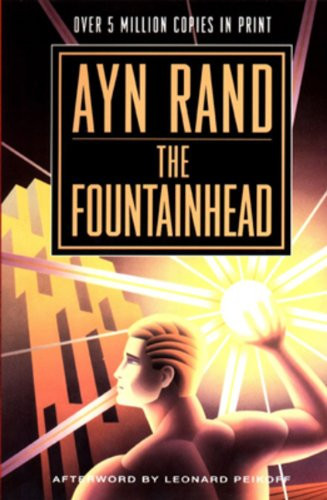
I recently finished reading The Fountainhead and found it to be very well written and quite an interesting book. Ayn Rand built quite a following from it and her other work Atlas Shrugged.
The hero of The Fountainhead, Howard Roark, has mastered divine co-creation in architecture, and her presentation of that is quite inspired and makes the book well worth reading just for this. Unfortunately though, all of her characters have no understanding of unconditional love, so it is quite awful from that point of view. Here, the villain, Ellsworth Toohey, explains how spirituality has been used to control and exploit humanity through the ages.

Don’t allow men to be happy. Happiness is self-contained and self-sufficient. Happy men have no time and no use for you. Happy men are free men. So kill their joy in living. Take away from them whatever is dear or important to them. Never let them have what they want. Make them feel that the mere fact of a personal desire is evil. Bring them to a state where saying 'I want’ is no longer a natural right, but a shameful admission. Altruism is of great help in this. Unhappy men will come to you. They’ll need you. They’ll come for consolation, for support, for escape. Nature allows no vacuum. Empty man’s soul--and the space is yours to fill. I don’t see why you should look so shocked, Peter. This is the oldest one of all. Look back at history. Look at any great system of ethics, from the Orient up. Didn’t they all preach the sacrifice of personal joy? Under all the complications of verbiage, haven’t they all had a single leitmotif: sacrifice, renunciation, self-denial? Haven’t you been able to catch their theme song--’Give up, give up, give up, give up’? Look at the moral atmosphere of today. Everything enjoyable, from cigarettes to sex to ambition to the profit motive, is considered depraved or sinful. Just prove that a thing makes men happy--and you’ve damned it. That’s how far we’ve come. We’ve tied happiness to guilt. And we’ve got mankind by the throat. Throw your first-born into a sacrificial furnace--lie on a bed of nails--go into the desert to mortify the flesh--don’t dance--don’t go to the movies on Sunday--don’t try to get rich--don’t smoke--don’t drink. It’s all the same line. The great line. Fools think that taboos of this nature are just nonsense. Something left over, old-fashioned. But there’s always a purpose in nonsense. Don’t bother to examine a folly--ask yourself only what it accomplishes. Every system of ethics that preached sacrifice grew into a world power and ruled millions of men. Of course, you must dress it up. You must tell people that they’ll achieve a superior kind of happiness by giving up everything that makes them happy. You don’t have to be too clear about it. Use big vague words. ’Universal Harmony’--’Eternal Spirit’--’Divine Purpose’--’Nirvana’--’Paradise’--’Racial Supremacy’--’The Dictatorship of the Proletariat.’ Internal corruption, Peter. That’s the oldest one of all. The farce has been going on for centuries and men still fall for it. Yet the test should be so simple: just listen to any prophet and if you hear him speak of sacrifice--run. Run faster than from a plague. It stands to reason that where there’s sacrifice, there’s someone collecting sacrificial offerings. Where there’s service, there’s someone being served. The man who speaks to you of sacrifice, speaks of slaves and masters. And intends to be the master. But if ever you hear a man telling you that you must be happy, that it’s your natural right, that your first duty is to yourself--that will be the man who’s not after your soul. That will be the man who has nothing to gain from you. But let him come and you’ll scream your empty heads off, howling that he’s a selfish monster. So the racket is safe for many, many centuries. But here you might have noticed something. I said, ’It stands to reason.’ Do you see? Men have a weapon against you. Reason. So you must be very sure to take it away from them. Cut the props from under it. But be careful. Don’t deny outright. Never deny anything outright, you give your hand away. Don’t say reason is evil--though some have gone that far and with astonishing success. Just say that reason is limited. That there’s something above it. What? You don’t have to be too clear about it either. The field’s inexhaustible. ’Instinct’--’Feeling’--’Revelation’--’Divine Intuition’--’Dialectic Materialism.’ If you get caught at some crucial point and somebody tells you that your doctrine doesn’t make sense--you’re ready for him. You tell him that there’s something above sense. That here he must not try to think, he must feel. He must believe. Suspend reason and you play it deuces wild. Anything goes in any manner you wish whenever you need it. You’ve got him. Can you rule a thinking man? We don’t want any thinking men."
Unfortunately, this is how spirituality is taught by many. You must practice yamas, niyamas, selfless service, sacrifice, renunciation and self-denial all day every day to achieve that superior kind of happiness. Well, this is simply not true, but you do need to devote about an hour each day with the mind turned inward. This can be done at any time while engaged in any activity that allows for an inward focus, from meditating to exercising, to eating food to having sex. Then in a few months or even weeks, you'll suddenly discover that superior kind of happiness that really does exist.
Of course, once you've realized that this inner happiness is far greater than any external happiness, you may desire to prolong your periods of inner focus, which to the casual observer may appear to be sacrifice, renunciation and self-denial but is in fact the exact opposite.
Ayn Rand on the other hand knew very little about happiness, as can be seen in this excerpt from an article on her at nymag.com.

Rand approached her. “Would you tell me what is the most important thing in life to you?” she asked, showing once again her flair for smooth opening lines. “My mother,” the girl answered. Rand turned away, disgusted. As an adult, she called this exchange “the first most important event in my life socially” and analyzed it as follows: “I had thought she was a serious girl and that she was after serious things, but she was just conventional and ordinary, a mediocrity, and she didn’t mean anything as a person.”
The happiness that girl knew, which most people know, was beyond Ayn Rand's understanding. It's too bad that Ayn Rand died before the book Love You Forever was published, for if she had the opportunity to read that book, she might finally have understood what that girl was talking about.

